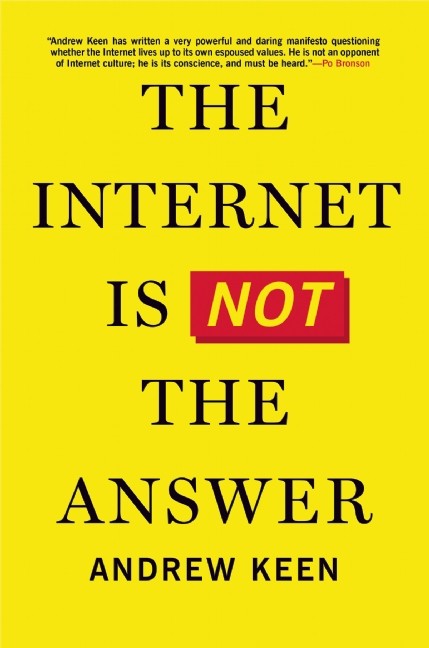The Internet Is Not the Answer by Andrew Keen
January 15, 2015
Andrew Keen explores the economic and cultural pitfalls of the Internet.

The Internet Is Not the Answer by Andrew Keen, Atlantic Monthly Press, 288 pages, $25.00, Hardcover, January 2015, ISBN 9780802123138
Because we focus on business books here at 800-CEO-READ, and business books tend to focus on the benefits of digital technology and the Internet, we tend to focus on those benefits, and the belief that they always are benefits. We champion books, for instance, like The Intel Trinity (our book of the year for 2014) about the men that built the company that built the tool—the microprocessor—that is building the digital age and accelerating change in accordance with Moore’s Law. And they are worth championing.
But as phrases like “disruption” and “creative destruction” are bandied about as positive forces for change, we don’t pay much mind to the world that is being disrupted, destroyed, and innovated out of existence—or those making a living in it. Andrew Keen, with The Internet Is Not the Answer, wrote a book that allows us to address that.
He argues that, rather than society adhering to the dogmas of a bygone industrial age:
[T]he real dogma of our libertarian age lies in glamorizing the turning of things upside down, in rejecting the very idea of “permission,” in establishing a cult of disruption.
He charges that the Internet is one of the main drivers of increased economic disparity and cultural degeneration, and sees a platform whose users are victims, not beneficiaries:
The more we use the contemporary digital network, the less economic value it is bringing to us. Rather than promoting economic fairness, it is a central reason for the growing gulf between rich and poor and the hollowing out of the middle class. Rather than making us wealthier, the distributed capitalism of the new networked economy is making most of us poorer. Rather than generating more jobs, this digital disruption is a principal cause of our structural unemployment crisis. Rather than creating more competition, it has created immensely powerful new monopolists like Google and Amazon.
In dissecting the current paradigm, he details a history of where the Internet came from, starting with an effort to track German planes in the skies above London during The Blitz in WWII, through the technologies race of the Cold War and the invention of the World Wide Web in 1989, on into Web 2.0 and beyond. It’s a fascinating story that in some way mirrors the more rose-colored lenses on the present seen in books like Walter Isaacson’s Innovators, but Keen believes that:
With the creation of the Web came the creation of a new kind of capitalism. And it has been anything but a cooperative venture.
It is what he calls “The One Percent Economy,” in which Silicon Valley resembles the upstairs/downstairs world of Downton Abbey. The difference is that, while touting the supposed social benefits of the Web, the new tech elite doesn’t have the sense of cultural responsibility or social constraints the old aristocracy had. And he believes the Internet’s “cultural ramifications are equally chilling.” Beyond the larger conversation around surveillance and privacy, he sees a network that:
Rather than creating more democracy … is empowering the rule of the mob. Rather than encouraging tolerance, it has unleashed such a distasteful war on women that many no longer feel welcome on the network. Rather than fostering a renaissance, it has created a selfie-centered culture of voyeurism and narcissism. Rather than establishing more diversity, it is massively enriching a tiny group of young white men in black limousines. Rather than making us happy, it’s compounding our rage.No, the Internet is not the answer. Not yet, anyway.
So, if the Internet is not the answer, what is? The first is that the wealthy tech elite take more responsibility for addressing the inequalities and other social ills they have created::
“Move fast and break things” was the old hacker ethic; “you break it, you own it” should be the new one.
The other is that we must eschew the Silicon Valley dogma to “think differently” and return to some traditional institutions and regulations—like labor unions and anti-trust laws—that have waned:
Above all, we should applaud the efforts of small publishers like Melville House’s Dennis Loy Johnson to challenge the increasingly monopolistic power of Amazon in the book business. “How is this not extortion?” Johnson asked about Amazon’s 2014 decision to delay shipments of books from Hachette … after they failed to agree to a business arrangement in which Amazon demanded broader discounts and extra marketing fees. “You know, the thing that is illegal when the mafia does it.”
It is only because we haven’t decided it is and pressured those that represent us in government to at least have that debate. It’s about time we do.



